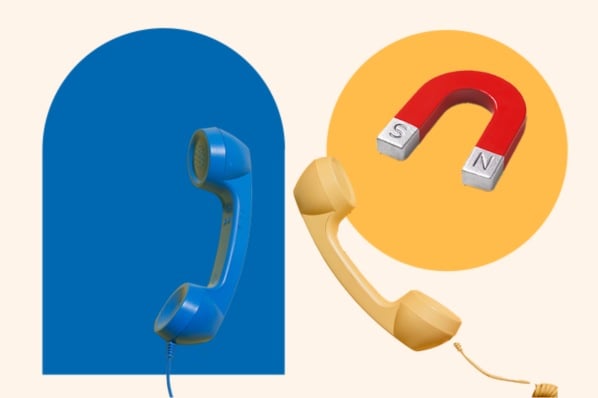It’s hard to say “no” to prospects. After all, you’re trying to get them to say yes -- so rejecting their ask or giving them an answer they don’t want to hear can feel risky.

But unless you want to make promises you can’t keep, give buyers unrealistic expectations, or commit to unfavorable terms, be prepared to deny them once in a while.
If you encounter any of the six situations below, tell the prospect “no.”
1) They Ask for Customer References Too Early
Prospects ask to speak to your customers for a variety of reasons: They want an unbiased opinion of your product, they’re not sure whether to trust you, their company requires references, or they’re simply trying to brush you off.
Yet unless it’s toward the end of their sales process, offer an alternative. Not only do reference requests add indefinite delays, they’re usually unnecessary. If you’ve consistently built trust with the prospect, they shouldn’t need to verify with a third party.
It’s also unfair to ask your customers to spend valuable time talking to prospects if you don’t know whether those prospects are serious.
Not sure how to say “no” to these requests? Check out 12 different strategies.
2) They Ask For Unrealistic Results
It’s tempting to say yes when prospects ask for improbable -- but not impossible -- results. Sure, 99% of your customers boost customer satisfaction by 5 to 10%, but raising it by 30% is in the realm of possibility. The very, very distant realm.
However, part of good sales qualification is giving the prospect a gentle reality check. This will serve you far better in the long run -- you don’t want to start a relationship based on unrealistic expectations. When the prospect’s results fall short, they won’t blame themselves: They’ll blame you and/or your product.
In these situations, case studies and customer data are your best friends. If the prospect asks, “Could we increase customer satisfaction by 30%?”, give a data-backed answer like:
“Although that’s not impossible, our similar clients usually see an 8% raise. Given your industry and starting percentage, I’d say 7 to 11% is most likely.”
3) They’re Looking For a Feature You Don’t Have
When a prospect asks about a missing feature, some reps will tell them that feature is in the works. Then they cross their fingers the prospect won’t notice it never materializes.
Not only is this strategy unethical, but it’s also bad for business. If the buyer asks about, say, offline data backup, it’s probably because it's crucial to their operations -- and they’re not going to forget about it in a couple months.
Rather than making promises you can’t keep, figure out why the prospect wants that specific option. Once you’ve identified their needs, you can offer a potential workaround. If there's really no solution, be prepared to walk away from the deal.
4) They Ask For a Discount Right Away
Prematurely handing out discounts can destroy your business. After all, once a buyer sees that you’ll bend under pressure, they’re likely to demand another concession … and another ... and another. You can avoid going down this rabbit hole by putting off price discussions until the prospect has bought into your product's value.
Plus, slashing your product’s price too early can lessen its perceived value. Imagine you’re choosing between cars: One that costs $30,000, and another that was originally $30,000 but has been marked down to $10,000. Which car seems safer and better built? Probably the first one.
For better or for worse, people equate value with price. You don’t want to cheapen the prospect's perception of your product before they fully appreciate it.
Nonetheless, refusing to give discounts without pissing prospects off or making them walk away is easier said than done.
5) They Ask For a Trial Extension
Trial extension requests are rarely a good sign. If the prospect hasn’t had the chance to properly evaluate your product, you probably didn’t create enough urgency or get their full commitment before the trial began.
It’s also possible they’ve tried it and haven’t seen enough value -- in which case, they’re probably not your ideal buyers.
If it’s unlikely the prospect will end up buying, don’t extend their trial. There’s no point in extending the process and wasting everyone’s time.
However, if you think a deal might happen, figure out why they want an extension. Did all of their stakeholders test the product? Did they try out the core features?
Together, develop a clear definition of what "success" would look like. With clear goals and metrics, the prospect is much likelier to actually use and benefit from a longer trial.
6) They Make an Unreasonable Demand
If you’re mid-negotiation and the prospect demands a ridiculous concession or drastic discount, don’t be afraid to turn them down. Compromising is good, even necessary -- but taking a deal that’s unprofitable or clearly risky is not.
Furthermore, people often make extreme demands as a bargaining strategy. Let’s say the prospect wants to pay $10 a seat. They might begin by asking for $2 a seat, so that you’ll eagerly accept by the time they “settle for” a higher price.
Rather than giving a knee-jerk “No way!” to their demand, simply repeat it back to them. You’ll get a couple extra seconds to think. In addition, just hearing their request in your words might make them reconsider.
If they refuse to budge, on the other hand, it’s usually time to walk away.
“No” is an incredibly powerful word to have at your disposal. And once you start seeing its effects, wielding it will definitely become easier.
Are there any situations in which you always say “no”? Let us know in the comments!


![How to Use BANT to Qualify Prospects in 2024 [Expert Tips]](https://www.hubspot.com/hubfs/bant-questions-6606f7b6c0d9e.webp)


![21 Signs Your Buyer Is a Poor Fit [Sales Process Checklist], According to HubSpot's Former Sales Director](https://www.hubspot.com/hubfs/Bad%20fit%20checklist.jpg)




